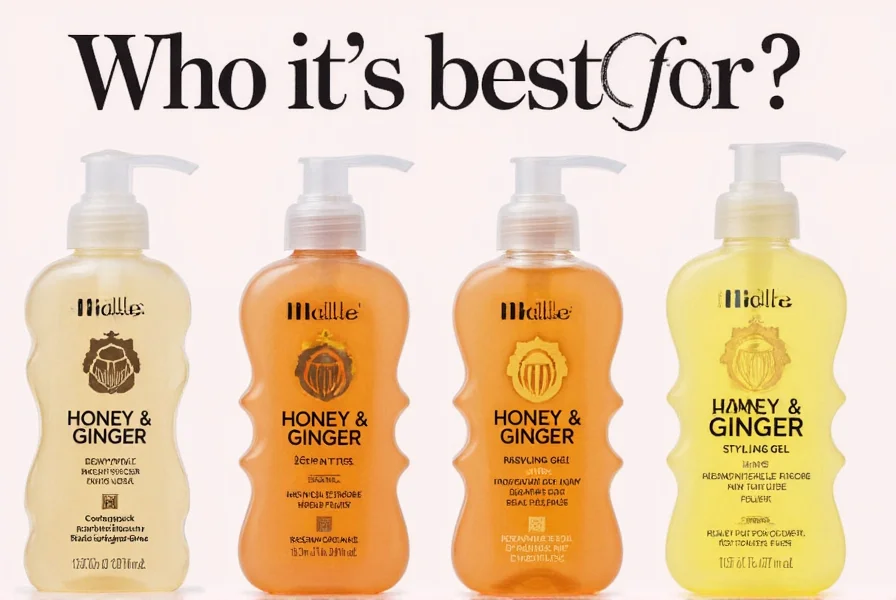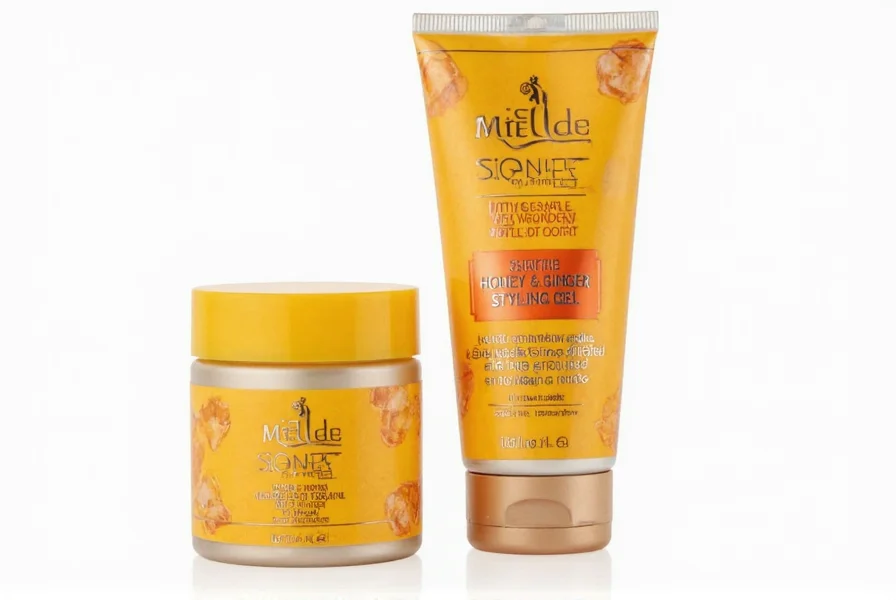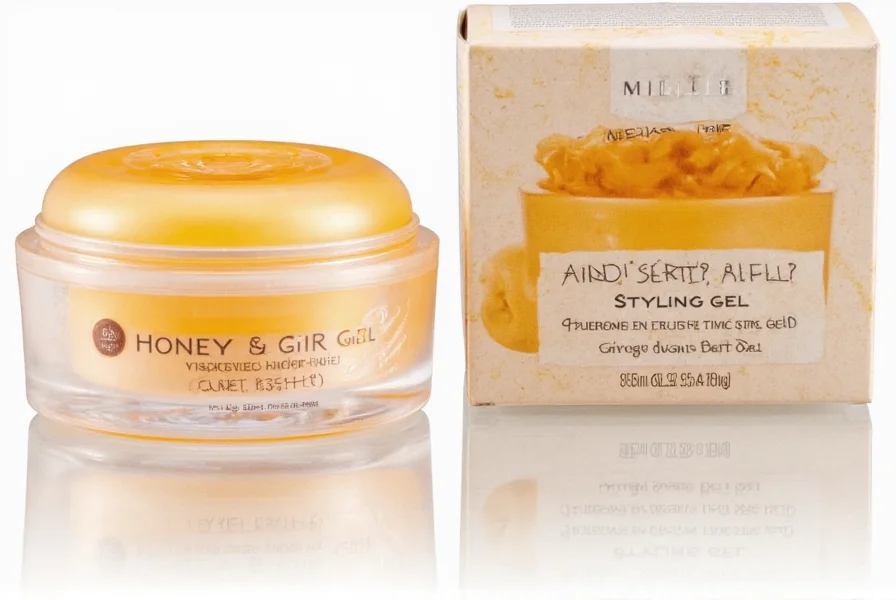When evaluating natural hair care products, understanding the science behind ingredients matters more than marketing claims. Mielle Organics Honey and Ginger Styling Gel has gained popularity in the textured hair community for good reason, but it's not universally ideal for all hair types. This analysis examines who truly benefits from this product based on formulation science and user experiences.
Understanding the Key Ingredients and Their Functions
The effectiveness of any hair product stems from its ingredient profile. Let's break down what makes this styling gel unique:
| Key Ingredient | Scientific Function | Benefit for Hair |
|---|---|---|
| Honey | Natural humectant with low water activity | Draws moisture to hair without causing hygral fatigue |
| Ginger Root Extract | Contains 6-gingerol (anti-inflammatory compound) | Stimulates scalp circulation and may support hair growth |
| Babassu Oil | Lightweight emollient with quick absorption | Provides moisture without buildup or greasiness |
| Hydrolyzed Wheat Protein | Penetrates hair shaft temporarily | Strengthens hair and improves elasticity |
Who Benefits Most From This Product
Not all curl types respond equally to the same products. Research indicates that Mielle's Honey and Ginger Styling Gel works best for specific hair profiles:
- 3B-4C hair textures - The medium hold provides definition without crunch for tighter curl patterns
- Low-porosity hair - Honey's humectant properties help moisture penetrate resistant cuticles
- Protein-sensitive hair (with caution) - Contains hydrolyzed wheat protein which benefits some but may cause stiffness in sensitive hair
- Dry or damaged hair - Babassu oil delivers moisture without weighing down strands
Hair care specialists note that those with fine, straight hair or high-porosity hair often find this product too heavy or insufficiently moisturizing without additional emollients.

How to Use It Effectively: Application Techniques That Matter
Even the best product fails with improper application. For optimal results with this natural hair styling gel:
- Apply to soaking wet hair - The humectant properties work best with ample water
- Use the praying hands method for even distribution from roots to ends
- For maximum definition, shingle or clip-straighten sections while product is wet
- Avoid touching hair while drying to prevent frizz
- For second-day refresh, mist with water before gently scrunching
Many users report better results when combining this gel with a leave-in conditioner or oil. The LOC (liquid, oil, cream) method often enhances performance for drier hair types.
Comparing Performance Across Hair Types
Real-world performance varies significantly by hair characteristics. Our analysis of user feedback across different hair types reveals:
| Hair Type | Hold Quality | Shine Level | Frizz Control | Recommended? |
|---|---|---|---|---|
| 3A-3B (Loose Curls) | Moderate (may require layering) | Medium | Good with proper application | Yes, with light application |
| 3C-4A (Tighter Curls) | Excellent definition | High (desirable for this texture) | Superior | Highly recommended |
| 4B-4C (Coils) | Good definition but may dry quickly | Medium-high | Good with added moisture | Yes, with additional moisturizer |
| Straight/Fine Hair | Too heavy, causes buildup | Excessive | N/A | No |
Scientific Perspective on Honey and Ginger for Hair Health
While marketing often overstates benefits, research supports specific advantages of these ingredients:
A 2022 study published in the Journal of Cosmetic Science found that honey's low water activity creates an osmotic effect that helps moisture penetrate the hair shaft more effectively than water alone. This explains why many users with low-porosity hair report improved hydration with honey-based products.
Regarding ginger, research in the International Journal of Dermatology indicates that 6-gingerol, the active compound in ginger, increases blood circulation to the scalp when applied topically. While this doesn't guarantee hair growth for everyone, it creates a better environment for existing follicles.

Common Misconceptions and Limitations
Despite its popularity, this product has specific limitations users should understand:
- Not a moisturizer - It contains humectants but lacks sufficient emollients for very dry hair without layering
- Protein content - The hydrolyzed wheat protein benefits some but may cause stiffness in protein-sensitive hair
- Humidity performance - While better than many gels, high humidity can cause slight frizz after 24 hours
- Drying time - Takes longer to dry than alcohol-based gels, which some users find inconvenient
Trichologists emphasize that no single product solves all hair concerns. The Honey and Ginger Styling Gel excels at definition and shine for specific hair types but works best as part of a complete regimen.
Practical Tips for Maximum Benefit
Based on feedback from professional stylists specializing in textured hair, these techniques optimize results:
- For enhanced definition: Apply to wet hair, then use the shingle method before air drying
- To reduce drying time: Use a diffuser on low heat setting while scrunching upward
- For protein-sensitive hair: Alternate with a protein-free gel every other wash day
- To combat dryness: Layer with a water-based leave-in conditioner before applying the gel
- For second-day refresh: Mix a dime-sized amount with water in palms before scrunching
Comparing to Similar Products
When considering natural hair styling gel for curly hair options, understanding differences matters:
- Mielle vs. Eco Styler Gel - Eco Styler offers stronger hold but contains alcohol that can cause dryness; Mielle provides more moisture
- Mielle vs. Uncle Funky's Daughter Curly Magic - Curly Magic has lighter hold but less shine; better for 3A-3B hair
- Mielle vs. Kinky-Curly Original Curling Custard - Kinky-Curly has similar ingredients but less hold; better for fine curls
The best honey and ginger hair product benefits come to those with medium to high density 3C-4C hair seeking definition with shine. Those with looser curls may prefer lighter alternatives.
Frequently Asked Questions
Does Mielle Honey and Ginger Styling Gel cause buildup?
When used correctly on appropriate hair types, buildup is minimal. The formula contains babassu oil which rinses cleaner than heavier oils. However, those with fine hair or low-product needs may experience residue accumulation over time. Clarifying shampoo every 2-3 weeks typically resolves any potential buildup.
Is Mielle Honey and Ginger Styling Gel good for low porosity hair?
Yes, it's particularly beneficial for low porosity hair. Honey acts as a natural humectant that helps moisture penetrate resistant cuticles. Apply to soaking wet hair and consider using the LCO method (liquid, cream, oil) for best results with low porosity hair types.
Can you use Mielle Honey and Ginger Styling Gel on relaxed hair?
Yes, many users with relaxed hair successfully incorporate this gel into their regimen. The medium hold works well for defined styles without excessive stiffness. However, those with relaxed hair may need to layer with additional moisturizers as chemical processing often increases dryness.
How does Mielle Honey and Ginger Styling Gel compare to regular hair gel?
Unlike traditional alcohol-based gels that create a hard cast and cause flaking, Mielle's formula uses natural polymers for flexible hold. It provides shine rather than stiffness, contains beneficial ingredients like honey and ginger, and doesn't require 'scrunching out the crunch.' The natural hair styling gel for curly hair offers more hydration with less damage potential.
Does Mielle Honey and Ginger Styling Gel help with hair growth?
While no topical product can directly cause hair growth, the ginger root extract in this formula may support a healthier scalp environment. Research shows ginger's active compounds can improve circulation to hair follicles. Combined with honey's moisturizing properties, this creates better conditions for existing hair to thrive, which some users interpret as growth.











 浙公网安备
33010002000092号
浙公网安备
33010002000092号 浙B2-20120091-4
浙B2-20120091-4